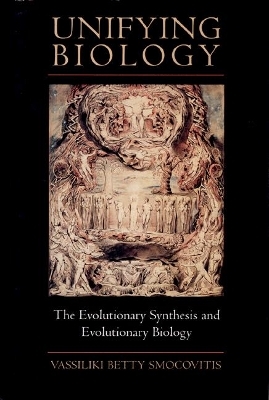
Unifying Biology
The Evolutionary Synthesis and Evolutionary Biology
Seiten
1996
Princeton University Press (Verlag)
978-0-691-03343-3 (ISBN)
Princeton University Press (Verlag)
978-0-691-03343-3 (ISBN)
Offers a historical reconstruction of the evolutionary synthesis of the 1930s and 1940s. This book argues that the evolutionary synthesis was part of a larger process of unifying the biological sciences. It suggests that the drive to unify the sciences of evolution and biology was part of a global philosophical movement toward unifying knowledge.
Unifying Biology offers a historical reconstruction of one of the most important yet elusive episodes in the history of modern science: the evolutionary synthesis of the 1930s and 1940s. For more than seventy years after Darwin proposed his theory of evolution, it was hotly debated by biological scientists. It was not until the 1930s that opposing theories were finally refuted and a unified Darwinian evolutionary theory came to be widely accepted by biologists. Using methods gleaned from a variety of disciplines, Vassiliki Betty Smocovitis argues that the evolutionary synthesis was part of the larger process of unifying the biological sciences. At the same time that scientists were working toward a synthesis between Darwinian selection theory and modern genetics, they were, according to the author, also working together to establish an autonomous community of evolutionists. Smocovitis suggests that the drive to unify the sciences of evolution and biology was part of a global philosophical movement toward unifying knowledge.
In developing her argument, she pays close attention to the problems inherent in writing the history of evolutionary science by offering historiographical reflections on the practice of history and the practice of science. Drawing from some of the most exciting recent approaches in science studies and cultural studies, she argues that science is a culture, complete with language, rituals, texts, and practices. Unifying Biology offers not only its own new synthesis of the history of modern evolution, but also a new way of "doing history."
Unifying Biology offers a historical reconstruction of one of the most important yet elusive episodes in the history of modern science: the evolutionary synthesis of the 1930s and 1940s. For more than seventy years after Darwin proposed his theory of evolution, it was hotly debated by biological scientists. It was not until the 1930s that opposing theories were finally refuted and a unified Darwinian evolutionary theory came to be widely accepted by biologists. Using methods gleaned from a variety of disciplines, Vassiliki Betty Smocovitis argues that the evolutionary synthesis was part of the larger process of unifying the biological sciences. At the same time that scientists were working toward a synthesis between Darwinian selection theory and modern genetics, they were, according to the author, also working together to establish an autonomous community of evolutionists. Smocovitis suggests that the drive to unify the sciences of evolution and biology was part of a global philosophical movement toward unifying knowledge.
In developing her argument, she pays close attention to the problems inherent in writing the history of evolutionary science by offering historiographical reflections on the practice of history and the practice of science. Drawing from some of the most exciting recent approaches in science studies and cultural studies, she argues that science is a culture, complete with language, rituals, texts, and practices. Unifying Biology offers not only its own new synthesis of the history of modern evolution, but also a new way of "doing history."
Vassiliki Betty Smocovitis is Assistant Professor of the History of Science in the Department of History at the University of Florida.
PrefaceAcknowledgmentsCh. 1The Exegesis of Unifying Biology3Ch. 2A "Moving Target": Historical Background on the Evolutionary Synthesis19Ch. 3Rethinking the Evolutionary Synthesis: Historiographic Questions and Perspectives Explored45Ch. 4The New Contextualism: Science as Discourse and Culture73Ch. 5The Narrative of Unifying Biology: The Evolutionary Synthesis and Evolutionary Biology97Ch. 6Reproblematizing the Evolutionary Synthesis191Ch. 7Epilogue211Select Bibliography217Index223
| Erscheint lt. Verlag | 1.12.1996 |
|---|---|
| Zusatzinfo | 2 halftones |
| Verlagsort | New Jersey |
| Sprache | englisch |
| Maße | 152 x 235 mm |
| Gewicht | 482 g |
| Themenwelt | Geisteswissenschaften |
| Naturwissenschaften ► Biologie ► Evolution | |
| Sozialwissenschaften | |
| ISBN-10 | 0-691-03343-9 / 0691033439 |
| ISBN-13 | 978-0-691-03343-3 / 9780691033433 |
| Zustand | Neuware |
| Haben Sie eine Frage zum Produkt? |
Mehr entdecken
aus dem Bereich
aus dem Bereich
Komplette Neuübersetzung. Mit einem Nachwort von Josef H. Reichholf.
Buch | Hardcover (2018)
Klett-Cotta (Verlag)
48,00 €
Wie die Vernichtung der Arten unser Überleben bedroht - Der …
Buch | Softcover (2023)
Penguin (Verlag)
15,00 €


